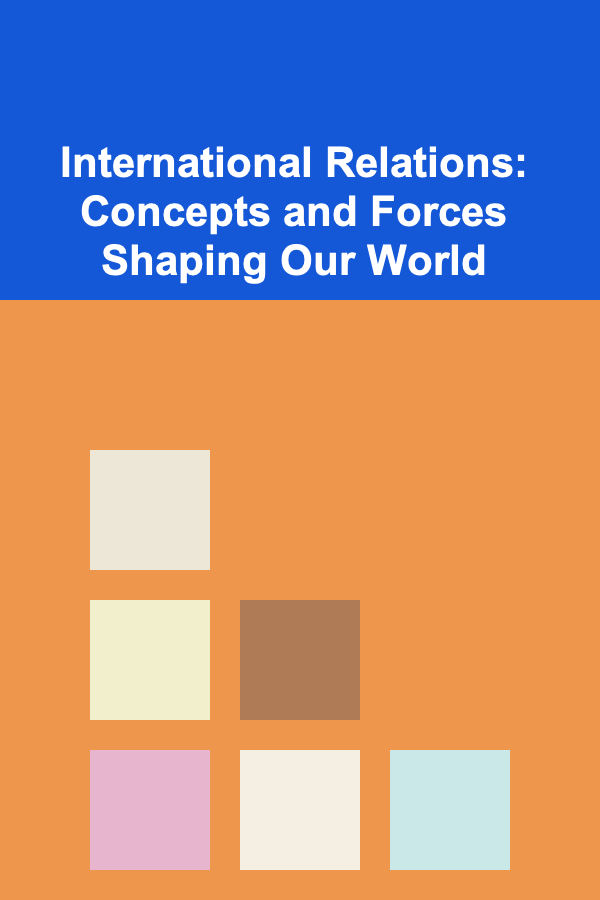
International Relations: Concepts and Forces Shaping Our World
ebook include PDF & Audio bundle (Micro Guide)
$12.99$11.99
Limited Time Offer! Order within the next:

International Relations (IR) is a field that encompasses the interactions among sovereign states, international organizations, non-governmental actors, and individuals across borders. It studies the dynamics that influence global cooperation, conflict, diplomacy, trade, and security. The field is both a theoretical and practical discipline, offering insights into the challenges and opportunities that shape our interconnected world. This actionable guide explores key concepts and forces driving international relations, offering a deep understanding of how these forces shape the global landscape.
The Evolution of International Relations
International relations as a field of study emerged in the early 20th century, partly in response to the devastation of World War I. The formation of institutions like the League of Nations and later the United Nations (UN) reflected the international community's desire for peace and cooperation. The two World Wars and the Cold War further shaped the development of IR, leading to the emergence of different theoretical perspectives to explain and predict state behavior and global trends.
Understanding the evolution of international relations provides a historical context for current global dynamics. As the world transitions from a bipolar order (U.S. vs. Soviet Union) to a more multipolar world, new challenges and opportunities are emerging.
Key Concepts in International Relations
2.1. Sovereignty
Sovereignty refers to the authority of a state to govern itself without external interference. It is a cornerstone of the international system, often depicted as the right of states to exercise control over their own territory, resources, and population. Sovereignty shapes how states interact in global affairs, balancing national interests with international expectations.
However, in a globalized world, the concept of sovereignty is increasingly contested. Issues like climate change, terrorism, human rights, and pandemics require transnational cooperation, which sometimes challenges the absolute sovereignty of states.
2.2. Power
Power is a fundamental concept in international relations, often defined as the ability of one actor to influence the actions of others. In IR, power can be military, economic, diplomatic, or even soft power. States and other actors use power to pursue their interests, such as security, economic prosperity, and political influence.
Power dynamics are shifting in the 21st century, with emerging powers like China, India, and Brazil challenging the traditional dominance of Western powers, particularly the U.S. The distribution of power in the international system has direct consequences for global governance, conflict, and cooperation.
2.3. Interdependence
Interdependence describes the mutual reliance between states or regions in the global system. It often refers to economic interdependence, where states are connected through trade, investment, and financial markets. However, interdependence also extends to environmental, security, and technological aspects, where the actions of one state can impact others.
Globalization has significantly increased interdependence, with the rise of multinational corporations, international trade agreements, and global supply chains. While interdependence can foster cooperation, it also exposes states to vulnerabilities such as economic recessions, environmental disasters, or geopolitical instability.
2.4. International Law
International law is a set of rules and norms governing the interactions between states and other international actors. It includes treaties, conventions, and customary laws that regulate areas such as trade, war, human rights, environmental protection, and diplomacy.
International law plays a critical role in promoting stability and predictability in global relations, but its enforcement is often inconsistent. States may violate international law without facing significant consequences, leading to calls for reform in global governance institutions.
2.5. Global Governance
Global governance refers to the ways in which international affairs are managed across borders. It includes the role of international institutions like the United Nations, the World Trade Organization, and the World Health Organization, as well as informal networks and bilateral agreements between states.
The effectiveness of global governance is often questioned due to power imbalances, insufficient enforcement mechanisms, and challenges in addressing global issues such as climate change, human rights, and conflict resolution.
Forces Shaping International Relations
Several forces shape the behavior of states and other international actors. These forces interact in complex ways, creating opportunities and constraints for global cooperation, conflict, and diplomacy.
3.1. Geopolitics
Geopolitics is the study of the geographical and strategic factors that influence international relations. Geography plays a critical role in determining a state's foreign policy, security concerns, and economic interests. For instance, states with large borders may prioritize border security, while island nations may focus on maritime security.
Geopolitical competition is particularly relevant today, as states like the United States, China, and Russia assert their influence in regions like the Indo-Pacific, the Arctic, and Eastern Europe. Rivalries and strategic alliances in these regions can have far-reaching global implications.
3.2. Economic Forces
Economic factors are central to international relations. States and non-state actors interact through trade, investment, finance, and labor. The global economy is interconnected through organizations such as the International Monetary Fund (IMF), the World Bank, and the World Trade Organization (WTO), which govern trade policies, financial stability, and development assistance.
The rise of emerging economies, shifts in global manufacturing hubs, and the increasing role of technology and innovation have transformed global economic dynamics. Trade wars, currency manipulation, and international sanctions are some of the tools used by states to achieve economic and political objectives.
3.3. Technological Advancements
Technology is reshaping international relations in profound ways. Innovations in fields like artificial intelligence, cybersecurity, biotechnology, and renewable energy are creating new challenges and opportunities for states and international organizations.
For example, cyberattacks are now a key element of modern warfare, and the race to control cutting-edge technologies like 5G networks has geopolitical ramifications. Technology also plays a role in the global distribution of information, influencing public opinion, state propaganda, and diplomatic relations.
3.4. Environmental Issues
Environmental challenges, such as climate change, resource depletion, and pollution, are increasingly shaping international relations. Climate change, in particular, is a global issue that requires international cooperation to address its far-reaching consequences, including rising sea levels, extreme weather events, and food security concerns.
International efforts like the Paris Agreement aim to mitigate climate change, but there are significant challenges, including differences in the responsibilities of developed and developing nations. Environmental diplomacy is expected to be one of the central focuses of global governance in the coming decades.
3.5. Cultural and Ideological Forces
Cultural and ideological factors also influence international relations. The spread of values such as democracy, human rights, and the rule of law, often promoted by Western powers, has had a significant impact on global politics. Conversely, some states resist these values, preferring alternative models of governance.
Religious and ethnic tensions often play a role in international conflicts, and the global discourse on social justice, gender equality, and cultural rights shapes international policies and negotiations.
3.6. Global Movements and Non-State Actors
In addition to states, non-state actors like multinational corporations, international NGOs, social movements, and individual activists play an increasingly significant role in shaping international relations. Global movements for human rights, climate action, and social justice are examples of non-state actors influencing policy at both the national and international levels.
Non-state actors often work to hold states and corporations accountable for violations of international law, environmental standards, and human rights. They also advocate for systemic changes to address global inequalities and injustices.
Challenges and Opportunities for Global Cooperation
4.1. The Rise of Multipolarity
The world is moving from a unipolar order, dominated by the United States after the Cold War, to a multipolar world where multiple countries, including China, India, and regional powers, are asserting themselves. This shift presents both opportunities for collaboration and risks of intensified competition and conflict. States must navigate this multipolar landscape to maintain global stability.
4.2. Managing Global Crises
Global challenges such as pandemics, economic recessions, and climate change require international cooperation. The COVID-19 pandemic, for instance, demonstrated both the need for global solidarity and the challenges of effective international coordination. States must learn to collaborate on crisis management, balancing national interests with global responsibilities.
4.3. The Role of International Institutions
International institutions, such as the United Nations, the World Health Organization, and the International Criminal Court, are critical in addressing global issues and mediating conflicts. However, these institutions often face criticisms of inefficiency, bias, or lack of enforcement power. Reforming and strengthening international institutions is essential to addressing contemporary challenges.
Conclusion
International relations is a dynamic and complex field, shaped by historical, geopolitical, economic, technological, environmental, and cultural forces. The interactions among states and non-state actors are constantly evolving, and understanding these forces is crucial for navigating the global landscape. As the world becomes more interconnected, the ability to adapt to changing dynamics and collaborate on shared challenges will define the future of international relations.
For students, policymakers, and global citizens alike, engaging with the complexities of international relations is essential for fostering a more peaceful, prosperous, and sustainable world.

How to Make the Most of Your Small Entryway
Read More
How to Organize Your Home Office for Better Productivity
Read More
How to Provide Support for Clients with Chronic Health Conditions
Read More
How to Set Up a Library that Adapts as Your Collection Grows
Read More
How to Stage Your Home for Families with Children
Read More
How to Use Baskets and Bins for a Tidy Pantry
Read MoreOther Products

How to Make the Most of Your Small Entryway
Read More
How to Organize Your Home Office for Better Productivity
Read More
How to Provide Support for Clients with Chronic Health Conditions
Read More
How to Set Up a Library that Adapts as Your Collection Grows
Read More
How to Stage Your Home for Families with Children
Read More